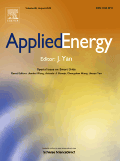
APPLIED ENERGY
Scope & Guideline
Driving impactful research for a sustainable energy landscape.
Introduction
Aims and Scopes
- Sustainable Energy Systems:
Research on integrated energy systems that utilize renewable resources and optimize energy consumption while minimizing environmental impact. - Energy Storage Technologies:
Development and assessment of various energy storage systems, including batteries, thermal storage, and alternative fuels, aimed at enhancing grid reliability and efficiency. - Renewable Energy Applications:
Exploration of practical applications of renewable energy sources such as solar, wind, and biomass in various sectors, including transportation, heating, and industrial processes. - Energy Policy and Economic Analysis:
Investigation of energy policies, market dynamics, and economic feasibility studies to support decision-making in energy transitions and sustainability. - Smart Grids and Demand Response:
Research on smart grid technologies and demand response strategies that promote energy efficiency and flexibility in power consumption. - Environmental Impact Assessments:
Evaluation of the environmental impacts of energy systems, focusing on carbon emissions, resource depletion, and ecological footprints. - Thermal Management Solutions:
Innovative thermal management techniques for improving energy efficiency in buildings and industrial applications, including phase change materials and advanced cooling systems. - Hybrid Energy Systems:
Integration of multiple energy sources and technologies to create resilient energy systems capable of adapting to varying demands and supply conditions.
Trending and Emerging
- Decarbonization Strategies:
Increasing focus on strategies for reducing carbon emissions across various sectors, emphasizing the need for sustainable practices and technologies. - Energy Flexibility and Demand Response:
Growing interest in energy flexibility solutions and demand response strategies that enhance system resilience and accommodate the integration of variable renewable energy sources. - Machine Learning and AI in Energy Systems:
Emerging applications of machine learning and artificial intelligence for optimizing energy management, predictive maintenance, and enhancing the performance of energy systems. - Hydrogen Economy and Fuel Cells:
A significant rise in research related to hydrogen production, storage, and applications, particularly in fuel cells, as part of the transition to a low-carbon economy. - Circular Economy in Energy Systems:
Increased exploration of circular economy principles in energy systems, focusing on waste-to-energy technologies, resource recovery, and sustainable materials. - Smart Building Technologies:
Emerging trends in smart building technologies that enhance energy efficiency through automation, IoT integration, and advanced energy management systems. - Hybrid Renewable Energy Systems:
Growing interest in hybrid systems that combine multiple renewable energy sources and storage technologies to optimize energy generation and usage. - Resilience and Adaptation Strategies:
Research on resilience strategies for energy systems in response to climate change and extreme weather events, emphasizing adaptive planning and design.
Declining or Waning
- Traditional Fossil Fuel Technologies:
Research on conventional fossil fuel technologies is decreasing as the focus shifts toward renewable and sustainable energy solutions. - Nuclear Energy Studies:
Interest in nuclear energy applications has waned in favor of more immediate and less controversial renewable energy sources, reflecting public sentiment and policy shifts. - Energy Efficiency in Non-Renewable Sectors:
The emphasis on improving energy efficiency in non-renewable sectors is declining as the focus moves towards decarbonizing and transitioning to renewable energy sources. - Standalone Renewable Solutions:
The exploration of standalone renewable energy solutions, without integration into broader systems, is declining in favor of hybrid and integrated approaches that optimize energy use. - Basic Energy Conversion Processes:
Research focused on fundamental energy conversion processes, such as basic thermodynamics, is becoming less prevalent as applied and innovative methodologies gain traction.
Similar Journals

INTERNATIONAL JOURNAL OF GLOBAL ENERGY ISSUES
Bridging Knowledge Gaps for a Sustainable Energy FutureThe INTERNATIONAL JOURNAL OF GLOBAL ENERGY ISSUES, published by INDERSCIENCE ENTERPRISES LTD, stands as a vital platform for disseminating innovative research in the fields of energy engineering, nuclear energy, and renewable sustainability. With ISSN 0954-7118 and E-ISSN 1741-5128, this journal has been catering to the energy sector since 1989, advancing scholarly dialogue through critical analyses and discussions of emerging energy technologies and policies. Though currently categorized in the fourth quartile across various energy-related disciplines, the journal aims to bridge knowledge gaps and offer insights that challenge the status quo. Operating from its headquarters in the United Kingdom and accessible to a global audience, the journal encourages submissions that drive interdisciplinary research and provide solutions for pressing global energy challenges. Researchers, professionals, and students alike are invited to contribute and engage with this prestigious journal to influence the future of energy practices.
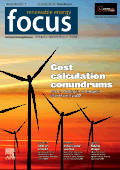
Renewable Energy Focus
Leading the Way in Sustainable Energy InnovationsRenewable Energy Focus is a premier journal published by Elsevier, dedicated to advancing the field of renewable energy and sustainability. With an ISSN of 1755-0084 and an E-ISSN of 1878-0229, this journal serves as a vital platform for researchers, professionals, and students interested in innovative solutions to energy challenges. Established in 2007, the journal has evolved to become a recognized authority in the subject area, currently ranked in the Q2 quartile of its category for 2023, emphasizing its significance in promoting impactful research. The journal encompasses a wide range of topics, including solar, wind, bioenergy, and sustainable practices that contribute to environmental conservation and energy efficiency. As part of Elsevier's commitment to disseminating high-quality research, Renewable Energy Focus is indexed in Scopus, currently holding a rank of #92/270 in the energy sector, positioning it in the 66th percentile of its field. This journal offers an essential resource for those dedicated to fostering sustainable energy solutions.

Frontiers in Energy Research
Driving the dialogue on energy sustainability and technology.Frontiers in Energy Research is a prestigious open-access journal published by FRONTIERS MEDIA SA, dedicated to advancing knowledge in the diverse fields of energy research. Launched in 2013, the journal has established itself as a pivotal platform for disseminating high-quality research, particularly in areas such as Economics and Econometrics, Energy Engineering and Power Technology, and Renewable Energy, Sustainability and the Environment. With a notable impact factor and impressive quartile rankings, including Q2 in multiple categories and a reputation for rigorous peer review, Frontiers in Energy Research offers researchers, professionals, and students alike a vital resource for exploring the latest innovations and insights in energy studies. Operating from its base in Lausanne, Switzerland, this journal is committed to enhancing open accessibility to relevant research, significantly contributing to the global dialogue on energy solutions and sustainability.

Clean Technologies, published by MDPI in Switzerland, is a pioneering open-access journal that has garnered significant recognition since its inception. Focusing on innovative solutions and practices for sustainability, it aims to serve the interdisciplinary field of clean technology while addressing pressing environmental challenges. With an impressive impact factor evidenced by its Q2 ranking in Environmental Science (miscellaneous) and Q3 in Global and Planetary Change, as well as a Scopus rank of #43 among a competitive pool of journals in these fields, Clean Technologies is positioned as a vital resource for researchers, professionals, and students alike. As a forward-thinking platform with open access since 2018, the journal emphasizes the dissemination of high-quality research, fostering collaboration and innovation in the quest for sustainable development. Located at ST ALBAN-ANLAGE 66, CH-4052 BASEL, SWITZERLAND, it also provides a comprehensive digital archive that allows for easy access to cutting-edge studies and findings relevant to global sustainability efforts.
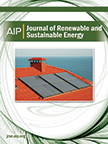
Journal of Renewable and Sustainable Energy
Shaping Sustainable Futures Through ResearchThe Journal of Renewable and Sustainable Energy, published by AIP Publishing, stands at the forefront of research in the fields of renewable energy and sustainable practices. With an ISSN of 1941-7012, this journal aims to foster innovative research and exchange of knowledge on sustainable technologies and methodologies that contribute to environmental conservation and energy efficiency. Achieving a prestigious Q2 ranking in the category of Renewable Energy, Sustainability, and the Environment, it ranks 135 out of 270 journals in Scopus, signifying its impactful contributions to the field. The journal, active from 2010 to 2024, provides a platform for authors, analysts, and practitioners to disseminate significant findings that can shape future environmental policies and energy frameworks. Although not currently an Open Access publication, it remains an essential resource for researchers dedicated to advancing sustainable development and energy solutions.
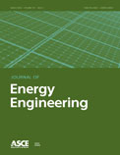
JOURNAL OF ENERGY ENGINEERING
Elevating Knowledge in Civil and Energy EngineeringJOURNAL OF ENERGY ENGINEERING, published by the ASCE-Amer Soc Civil Engineers, serves as a pivotal resource in the fields of civil and structural engineering, energy engineering, and nuclear energy research. With an ISSN of 0733-9402 and an E-ISSN of 1943-7897, this esteemed journal demonstrates a consistent commitment to advancing knowledge in energy systems, sustainability, and waste management. Ranking within the second quartile in several categories—including Civil and Structural Engineering and Energy Engineering and Power Technology—this journal maintains a strong reputation, underscored by its Scopus rankings that place it in the top tiers of its discipline. Accessible from 1982 through 2024, the journal provides researchers and professionals meaningful insights through rigorously peer-reviewed articles, critical reviews, and case studies that address contemporary challenges in energy utilization and infrastructure development. Without open access options, it ensures the integrity and credibility of published work, showcasing influential research that contributes to sustainable solutions in energy and environmental frameworks. Researchers, professionals, and students alike will find the JOURNAL OF ENERGY ENGINEERING an indispensable platform for exploration and dissemination of innovative ideas within the realm of energy and engineering.

Global Energy Interconnection-China
Fostering Collaborative Insights in Renewable EnergyGlobal Energy Interconnection-China is an esteemed Open Access journal published by KEAI PUBLISHING LTD that focuses on the rapidly evolving fields of energy engineering and power technology. Since its launch in 2018, the journal has become a vital resource for researchers and professionals interested in sustainable energy solutions and innovative technologies, addressing the critical challenges facing the global energy landscape. With an impressive Q2 categorization in multiple engineering and energy-related disciplines, the journal ranks highly in Scopus, positioning itself as a leading platform for disseminating impactful research. Specifically, it excels in Automotive Engineering and Control and Systems Engineering, as evidenced by its competitive standing within the top quantiles of its fields. By leveraging its open access model, Global Energy Interconnection-China ensures that high-quality research is accessible to a worldwide audience, fostering collaboration and advancements in renewable energy, sustainability, and environmental conservation. For researchers, professionals, and students alike, this journal serves as a pivotal forum for sharing insights and innovations that shape the future of energy interconnection.
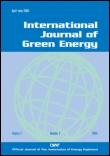
International Journal of Green Energy
Exploring the frontiers of green technology and sustainability.The International Journal of Green Energy is a premier publication that plays a pivotal role in the field of renewable energy and sustainability. Published by Taylor & Francis Inc, this journal, with ISSN 1543-5075 and E-ISSN 1543-5083, has established itself as a crucial platform for sharing innovative research and developments from 2005 to 2024. With a commendable Q2 ranking in the category of Renewable Energy, Sustainability and the Environment, it ranks 100 out of 270 in Scopus, positioning itself in the 63rd percentile of its field. The journal is dedicated to advancing knowledge and fostering dialogue around green technologies and sustainable practices, providing invaluable insights for researchers, industry professionals, and students alike. Although it does not offer open access options, the journal's commitment to rigorous peer review ensures that only high-quality research is published, making it an essential resource for those seeking to explore and understand the complexities of green energy solutions.

Smart Energy
Advancing the Frontier of Energy Research and SustainabilitySmart Energy, an esteemed publication by ELSEVIER, stands at the forefront of energy research, exploring innovative solutions and sustainability practices in the energy sector. With an impressive Open Access model since its inception in 2021, this journal has rapidly established itself as a vital resource for researchers and professionals alike, providing unrestricted access to high-quality peer-reviewed articles. Positioned in the Q1 category across multiple fields, including Energy Engineering and Power Technology, Renewable Energy, and Management, Monitoring, Policy and Law, Smart Energy demonstrates a strong commitment to advancing knowledge in the energy domain. Registered under the ISSN 2666-9552, it garners significant attention, ranking within the top ranges of Scopus metrics across various disciplines. The journal continuously aims to bridge the gap between academic research and practical application, making it an essential outlet for scholars and practitioners dedicated to fostering sustainable energy solutions worldwide. Located in the United Kingdom, Smart Energy is shaping the future of energy management from its publishing base in Amsterdam, the Netherlands.

Journal of Modern Power Systems and Clean Energy
Leading the Charge in Modern Power and Clean Energy Research.Journal of Modern Power Systems and Clean Energy is a leading academic platform dedicated to advancing the fields of energy engineering, power technology, and renewable energy. Published by the prestigious STATE GRID ELECTRIC POWER RESEARCH INSTITUTE in China, this Open Access journal has been a significant contributor to the dialogue on sustainable energy solutions since its inception in 2013. With a Q1 ranking in both the Energy Engineering and Power Technology and Renewable Energy, Sustainability and the Environment categories, it serves a crucial role for researchers and professionals striving to push the boundaries of innovation in power systems and clean energy technologies. The journal’s impact is reflected in its impressive Scopus rankings, placing it in the top 10% of its categories, making it an invaluable resource for academia and industry alike. The Journal of Modern Power Systems and Clean Energy invites submission of original articles, reviews, and case studies that resonate with its mission of promoting sustainability and addressing contemporary energy challenges.